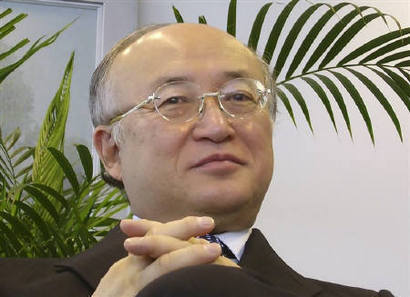Can Japan's candidate Amano end IAEA succession saga? By Albert Otti
 Vienna - Several months have now passed since the senior Japanese diplomat Yukiya Amano narrowly failed to be voted the next head of the International Atomic Energy Agency (IAEA).
Vienna - Several months have now passed since the senior Japanese diplomat Yukiya Amano narrowly failed to be voted the next head of the International Atomic Energy Agency (IAEA).
He is set to try again on Thursday, but diplomats in Vienna hesitate to make any predictions whether he can overcome the opposition of developing countries this time and become Director General when Mohamed ElBaradei retires in November.
When the IAEA's governing board meets Thursday, Amano's strongest opponent will be South Africa's representative at the nuclear agency, Abdul Minty, who is backed by a significant number of countries from the developing world.
At the inconclusive first round of voting in March, the two were the only two candidates, but they have since been joined by the Spanish head of the Paris-based Nuclear Energy Agency, Luis Echavarri, the Belgian nuclear industry executive Jean-Pol Poncelet, and by Ernest Petric, a Slovenian constitutional court judge.
While diplomats from several countries said that only Amano, Japan's ambassador to the United Nations in Vienna, stands a real chance to get the necessary support from two-thirds, or 24 countries, on the 35-country board, they stressed it was a close call.
"That is a tough one to predict," one Western diplomat said.
In an informal poll held in early June, Amano received 20 votes, Minty 11, and Echavarri 4.
The two other hopefuls were not supported by any country.
Amano has tried hard to woo developing countries by arguing that he would be a Director General for all IAEA member countries, not just for Western powers.
"I will make utmost efforts to reduce tension between developing and developed countries," Amano told board members at a hearing in May.
He stressed the IAEA was not a nuclear watchdog that only monitors suspect nuclear programmes in Iran and other countries, but that the Vienna-based agency also provided development and technical assistance in the fields of nuclear science and energy.
However, one European diplomat said of the view among developing countries: "They don't see him as a bridge between North and South."
And when ElBaradei said in an interview with the Austrian daily Der Standard on June 12 that "governments should get together and agree on a person, on a consensus candidate," it did not exactly sound like an endorsement for the Japanese ambassador.
If Minty's supporters refuse to finally join the many Western and Asian countries that favour Amano this week, the roster of candidates might once again have to be opened for a third round in the IAEA's ongoing succession saga.
In that case, both Amano and Minty would do good to consider whether to stay in the race, several diplomats said. "That's when they should take the interest of the agency above national interests," one diplomat said. (dpa)